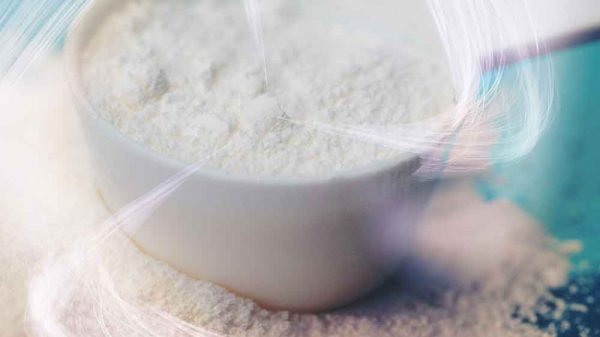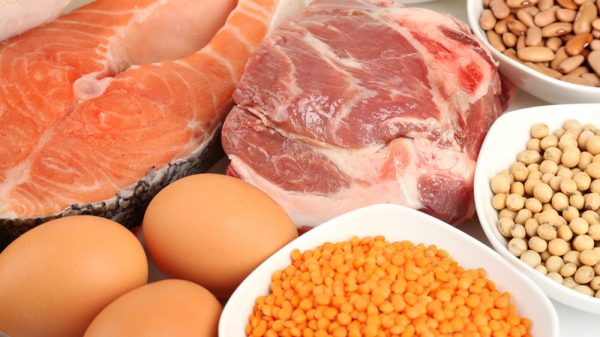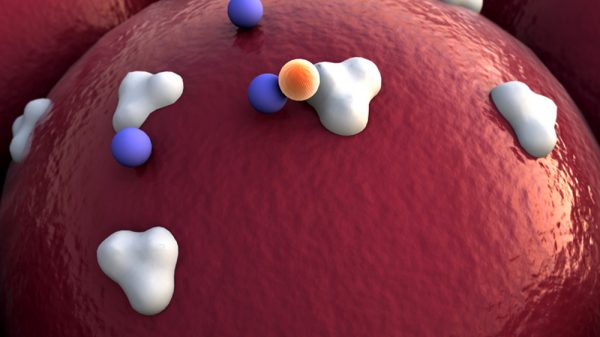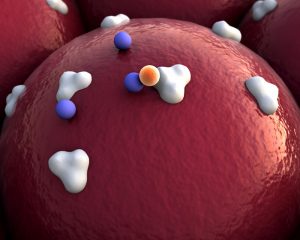Amino acids are the smallest protein units, and they are often described as the building blocks of proteins. Amino acids are relevant in the body because they are used in all biological mechanisms. Without optimal ratios of essential amino acids, the body is unable to function properly. Getting optimal ratios of essential amino acids and eating foods high in amino acids is even important for supporting the body against certain conditions like muscle wasting and fatty liver disease.
Read on to find out what you need to know about getting optimal ratios of essential amino acids, including foods high in amino acids.
What Are the Building Blocks of Proteins, Anyways?
Amino acids – also known as the building blocks of protein – interact with one another to form chains. These chains of amino acids then form secondary structures called alpha helices and beta sheets. Secondary structures then fold to create three-dimensional structures unique to each protein, depending on its function.
Nonessential vs Essential Amino Acids
There are generally two types of amino acids that are considered to be indispensable to human biological functioning.
The most important group of amino acids in our diet is the essential amino acids. There are nine essential amino acids altogether: methionine, histidine, leucine, isoleucine, valine, lysine, tryptophan, phenylalanine, and threonine. The body is unable to manufacture these essential amino acids endogenously, so it is imperative that you get essential amino acids from the foods you eat daily. Getting the essential amino acids the body needs helps support the synthesis of muscle tissue, connective tissue, neurotransmitters, hormones, and enzymes. Certain essential amino acids called the branched-chain amino acids (BCAAs) play a particularly important role in supporting muscle growth and liver function. The BCAAs are valine, leucine, and isoleucine. Moreover, when the body is stressed, it requires even higher levels of essential amino acids to help the body cope with stress-induced physiological changes.
Nonessential amino acids are amino acids that the body can produce internally. Therefore, it becomes unnecessary to ensure that you’re getting nonessential amino acids in the food that you eat. Certain nonessential amino acids are considered conditionally essential since the body benefits from some level of dietary intake in some situations. However, essential amino acids are indispensable to human health at all times, and they are the amino acids we will be discussing in this article.
Plant vs Animal Protein
Plant protein and meat protein are differentiated in terms of the quality of the protein. It’s crucial to point out that the number of grams of protein is less important than the protein’s quality.
Protein quality is measured by the protein digestibility-corrected amino acid score (PDCAAS). A PDCAAS that is closer to 1 indicates that a protein source offers a complete and balanced profile of essential amino acids. On the other hand, a PDCAAS lower than 1 indicates that the protein source offers an incomplete profile of essential amino acids that are necessary for optimal health.
Animal protein, regardless of the source, has a PDCAAS of 1. This means that a single animal protein source can provide all of the essential amino acids that the human body needs for the day.
However, plant proteins are regarded as incomplete proteins, and across the board have a PDCAAS that falls below 1. Soy protein – the protein in tofu – is the only protein source that contains all essential amino acids, but not in the balanced ratios that the body requires. Other plant protein sources like black beans, brown rice, nuts, and seeds are missing adequate levels of at least one essential amino acid, which is referred to as the limiting amino acid. When your body is missing one of the essential amino acids, it cannot utilize all of the essential amino acids in biological processes. The body requires all essential amino acids in careful amounts. This is why it is critical to obtain the essential amino acids in optimal ratios.
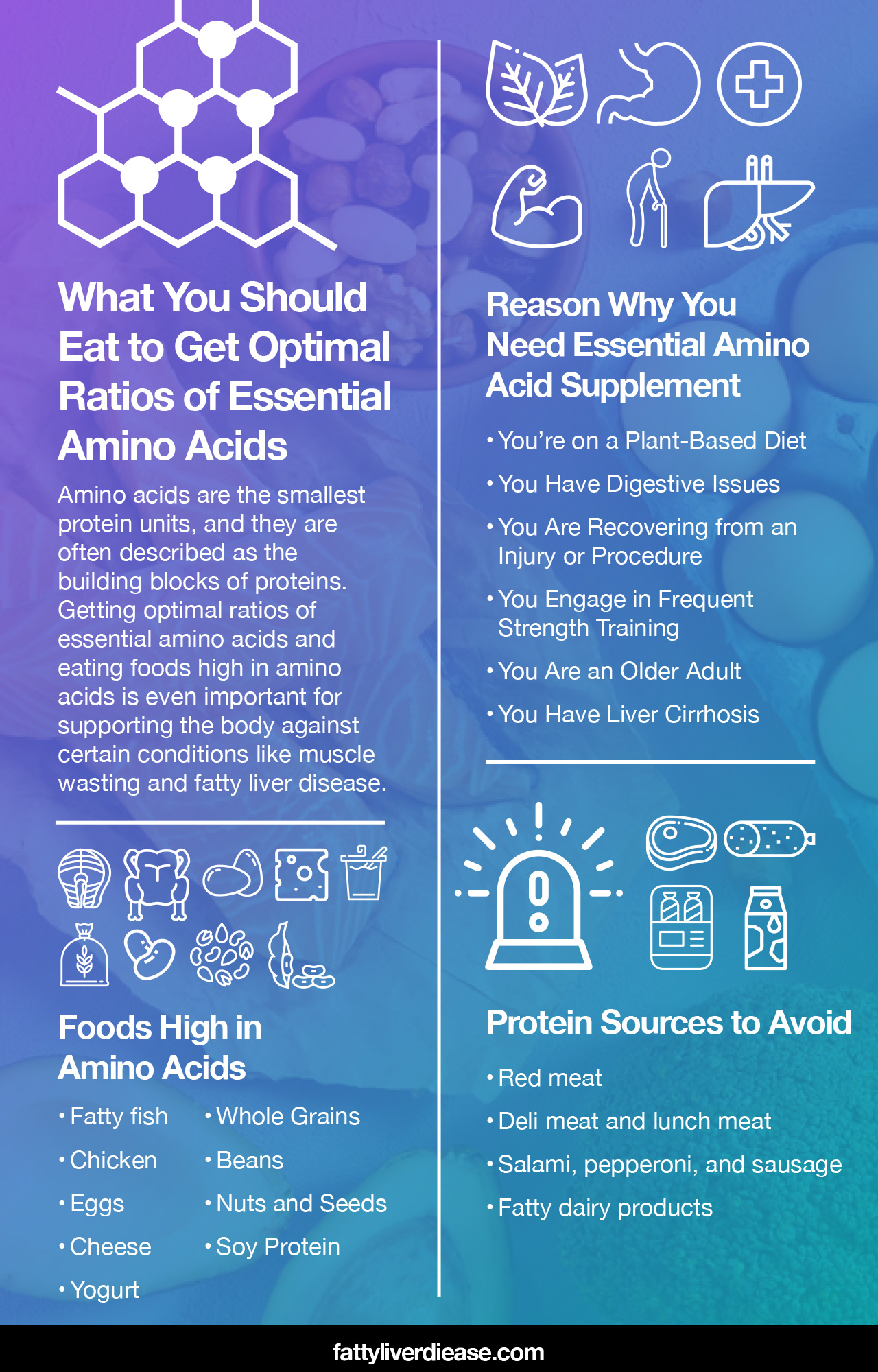
Foods High in Amino Acids
Here we describe both the plant-based and animal foods that you should be eating to ensure you’re getting the essential amino acids you need.
1. Fish
Fish is one of the highest quality proteins that you can eat. Fish contains an optimal ratio of essential amino acids and other critical nutrients such as vitamin D and omega-3 fatty acids. Fish is one of the only animal-based foods suggested for the Mediterranean diet, a diet associated with a lower prevalence of fatty liver disease, type 2 diabetes, and cardiovascular disease. The best fish to eat include salmon, sardines, Arctic char, and mackerel.
2. Chicken
Eating chicken breast is a good way to ensure that you’re getting all of the essential amino acids that you need to live a healthy life each and every day. Make sure to stick to chicken breast that is fresh and fed organic food. Stay away from the dark meat chicken, which tends to contain a lot of fat. Turkey is another lean meat that offers after mole ratios of essential amino acids.
3. Eggs
Eggs are an excellent source of healthy protein as packed with optimal ratios of essential amino acids. When eating eggs, stick primarily to the egg whites, since they are lower in fat. The egg yolk tends to be high in saturated fat, so it does contain a natural source of vitamin D. To prepare the proper ratio of egg whites and egg yolks, for every two egg whites, include one egg yolk to provide optimal ratios of essential amino acids, balanced out with a healthy amount of fat and vitamin D.
4. Cheese
Cheese contains balanced and complete ratios of essential amino acids. Low-fat cottage cheese and mozzarella cheese are excellent choices since they contain low levels of sodium and saturated fat.
5. Yogurt
Yogurt provides optimal ratios of essential amino acids. When shopping for yogurt, make sure to choose nonfat, low-sugar options.
6. Whole Grains
Whole grains are a vital source of protein as well as fiber, vitamins, and minerals. Substitute white and refined starches with whole grains like whole-wheat bread, quinoa, brown rice, rolled oats, and millet. Though it may take a little time to adjust to the flavor, once you’ve gotten used to whole grains, they will be a significant difference in your diet and health.
7. Beans
Beans are critical sources of protein in the plant-based or vegan diet. Moreover, beans are packed with fiber, vitamins, and minerals. To get more beans in your diet, try incorporating lentils, black beans, kidney beans, and white beans into your meals on a regular basis.
8. Nuts and Seeds
Nuts and seeds contain protein as well as fiber and anti-inflammatory polyunsaturated fats. To add more nuts to your diet, enjoy trail mix that contains cashews, walnuts, and pecans. Sprinkle hemp seeds, chia seeds, sunflower seeds, pumpkin seeds, and flaxseeds into your cereal, soups, and salad.
9. Soy Protein
Soy protein is derived from soybeans and is made into tofu and tempeh. Both tofu and tempeh serve as good meat substitutes both texturally and flavor-wise and can be seasoned in the same way as meat. Use tofu and tempeh in sauces, stews, and stir-fries.
Combining Plant Proteins
If you’re consuming a primarily plant-based diet, it’s critical to keep in mind that no plant-based food source offers ideal ratios of essential amino acids. Therefore, you cannot rely on one plant food as your primary source of protein. Because plant proteins are generally regarded as incomplete, combining them is key to ensuring that you’re getting the essential amino acids that you need while following a plant-based diet. Here are a few rules to keep in mind as you plan your meals:
Beans and protein-containing vegetables tend to have inadequate levels of methionine, while whole grains tend to be lower in threonine and lysine. Complementary pairings of plant-based protein include black beans and brown rice or kidney beans and quinoa.
Nuts and seeds tend to be missing adequate amounts of lysine and are best combined with legumes like beans, chickpeas, and lentils.
Why Supplementation Is Key
In many instances, it’s tough to get all of the essential amino acids that your body requires on a daily basis. Essential amino acid supplements provide a quick and easy way to supply your body with all of the raw materials it needs to function optimally.
1. You’re on a Plant-Based Diet
Eating a plant-based diet is healthy for many organ systems and helps you lose weight, combat fatty liver disease and cardiovascular disease, and fight against insulin resistance and type 2 diabetes. However, relying on plant-based proteins to get optimal ratios of essential amino acids might be difficult. Research published in the Journal of Nutrition suggests that plant protein may be less bioavailable than previously thought. (1)
As a result, in the case of veganism, supplementing with a high-quality essential amino acid supplement helps fill in the gaps and prevent you from having an amino acid insufficiency.
2. You Have Digestive Issues
If you suffer from inflammatory bowel disease, Crohn’s disease, or any other disorder that affects the digestive system, your system may have a hard time breaking down protein particles into their individual amino acids. Undigested protein is rendered useless and is then passed through the large intestine for excretion. As a result, your body is not absorbing the essential amino acids that are required for healthy muscle synthesis and immune function. However, a high-quality supplement already offers essential amino acids in their individual form, so the intestine can easily absorb them. The essential amino acid is gentle on the digestive system while still providing the body with the resources it needs to function optimally.
3. You Are Recovering from an Injury or Procedure
After an injury or surgery, the body utilizes essential amino acids at a more rapid rate than usual. As a result, the body’s requirement for essential amino acids increases during this time. It’s likely that you aren’t or are unable to consume optimal quantities and ratios of essential amino acids that support a speedy and complete recovery. As a result, supplementing with essential amino acids ensures that your body has the raw materials that it needs to recover quickly and completely. Essential amino acids are critical for healing from nearly all injuries and surgeries. A poignant example is the recovery process after weight loss surgery, in which the stomach and part of the intestines have been removed. Patients who have undergone weight loss surgery are severely restricted in the quantity and texture of food they can eat, making it less likely that they will consume an adequate amount of protein. An essential amino acid supplement would be absolutely crucial for helping the patient heal and maintain muscle mass.
4. You Engage in Frequent Strength Training
When you lift weights and engage in strength training, your muscles are challenged. The small fibers that make up your muscle tissue tear and must repair following an intense workout. Muscles require essential amino acids in order to properly repair and rebuild. If you are an athlete or engage and intense training, your muscles require more essential amino acids than usual. It’s possible that you aren’t eating sufficient amounts of essential amino acids to feed your muscles, especially if you are experiencing regular soreness that doesn’t seem to resolve quickly. Adding a high-quality essential amino acid supplement to your diet can help ensure that your muscles have all the raw materials that they need to support growth. Many athletes may choose to use protein powder, like whey protein or casein. However, keep in mind that taking essential amino acids in their individual form makes them more bioavailable. When taking whey protein or other protein, an extra step is involved. The body must first break down the protein particles into their individual amino acids, which the body can then use for muscle growth.
5. You Are an Older Adult
Older adults are naturally prone to sarcopenia, which is the loss of muscle tissue over time. Sarcopenia is a natural phenomenon that affects everyone, simply because as the aging process progresses, it becomes more difficult for the body to turn over muscle tissue and produce new healthy muscle. On top of that, older adults’ digestive systems don’t operate as effectively, and they face a harder time breaking down protein into individual amino acids. Plus, many older adults are averse to eating large quantities of protein and meat, simply because their appetite decreases over time. Taking essential amino acid powder helps supply older adults with the amino acids that they need to build muscle tissue, maintain their strength, reduce the risk of injury, and maintain a high quality of life.
6. You Have Liver Cirrhosis
Liver cirrhosis, or scarring of the liver, is particularly associated with muscle wasting and muscle loss. Cirrhosis-related muscle loss is connected to higher rates of mortality and a lower quality of life. Individuals with liver cirrhosis are also unable to process dietary protein efficiently. Getting essential amino acids in their individual form would help individuals with liver disease maintain quality of life and fight against the illness.
Protein Sources to Avoid
Of course, not all protein is created equal. Some protein sources are just generally regarded as unhealthy, even if they do provide all of the essential amino acids. Steer clear of these proteins:
- Red meat: Red meat refers to meat that has come from a cow. In many cases, ground beef, steak, and burgers are packed with saturated fat. This type of fat is detrimental to your health and is a direct contributor to conditions like obesity, fatty liver disease, insulin resistance, high cholesterol, and cardiovascular disease.
- Deli meat and lunch meat: These meats might seem like a great choice since they offer low-fat options and are packed with protein. However, low-fat doesn’t automatically equal healthy. Deli and lunch meats are often filled with sodium and preservatives that can drive up blood pressure.
- Salami, pepperoni, and sausage: There’s no doubt that these kinds of meat are delicious and taste good on everything from sandwiches to pizza. However, these processed meats are filled with saturated fat. Do you know the lighter, white areas of meat? These areas indicate the presence of saturated fat. Not to mention that processed meats also contain high levels of sodium and preservatives that can increase blood pressure.
- Fatty dairy products: The fat in dairy products is the same harmful fat that is found in fatty meat products. To help keep systemic inflammation and the risk of heart disease low, choose nonfat and low-fat dairy products. Also, be on the lookout for high levels of sodium that are often found in hard cheeses and added sugars that are often found in yogurt.
Conclusion
Essential amino acids are absolutely indispensable nutrients for human health. They play a vital role in supporting muscle synthesis, immune function, mood stability, and growth. Humans require optimal ratios of essential amino acids on a daily basis in order to support their health. Knowing the best animal proteins, plant proteins, and supplements to use is crucial to ensuring that you’re getting all the essential amino acids that you need on a daily basis.
References:
